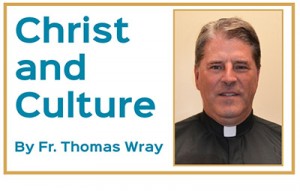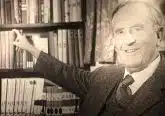C.S Lewis, Sigmund Freud and the Holy Trinity
 C.S. Lewis famously likened the task of Christian apologetics to a a jeweler displaying a beautiful diamond. To appreciate its luminous qualities, the jeweler prepared it for viewing by holding it over black velvet fabric. Only against such a contrast can the dazzling colors dance and sparkle.
C.S. Lewis famously likened the task of Christian apologetics to a a jeweler displaying a beautiful diamond. To appreciate its luminous qualities, the jeweler prepared it for viewing by holding it over black velvet fabric. Only against such a contrast can the dazzling colors dance and sparkle.
So it is, he argued, for those seeking to understand God’s plan for their lives. We need to step back from time to time and examine our conscience, asking ourselves, what are we focusing on? Jesus continually calls us to pause and reflect on whose promises and perspectives are shaping our lives: “you have heard it said, but I say to you” (Matt. 5.21).
Take the Solemnity of the Most Holy Trinity (Sunday, May 22 this year) as a case in point. If we believe, as many do, that Catholicism is a man-made religion, this month’s feast is frankly meaningless. What place should we give one set of religious claims that float in a sea of competing claims? On what basis do we prioritize those claims?
Recall that this feast occurs in same month the world celebrates the birthday of a man who arguably launched the modern atheistic movement. Along with Karl Marx and Frederick Nietzsche, invented the worldview of scientific materialism and skepticism.
To Freud, God is an illusion based on the infantile emotional need for a supernatural pater familias. The universe and our lives can therefore only be random — meaningless events unfolding in a permanently dark human unconscious. As Pope Benedict XVI taught us this ideology has resulted in “the eclipse of God” in public life.
If, by contrast, we with our Catechumens accept “all that the Catholic Church believes, teaches and proclaims is revealed by God,” well then the Holy Trinity is a different thing altogether. It is God’s loving self-definition. “God himself is an eternal exchange of love, Father, Son and Holy Spirit, and he has destined us to share in that exchange” (CCC 221).
Again, the searingly counter-cultural words of the atheist-turned convert C.S. Lewis: “Everyone says that ‘God is love.” But this makes no sense unless God contains at least two persons. Love is a something that one person has for another person. If God was a single person, then before the world was made, He was not love.”
Where and how does the Holy Trinity connect to your life? What difference does it make for you that the universe is not a random association of particles and gasses, but rather the work of a single loving God who creates, sustains and directs it? What difference does it make for you that you are part of that universe, that your life is created, sustained and directed by an eternal exchange of love? How is the Holy Trinity calling you to live your life more generously as an exchange of love?
May you find and make time this month to live into the answer to those questions!
Welcome to Christ and Culture. Here Father Thomas Wray explores connections between Jesus Christ and his people through the lens of our modern culture.
Previous Christ and Culture installments
Pope Francis and the fatal metaphor of progress
Coaches, players and disciples
Brooklyn: Homesickness and the Lenten journey
The Super Bowl and the Episcopalian Divorce













